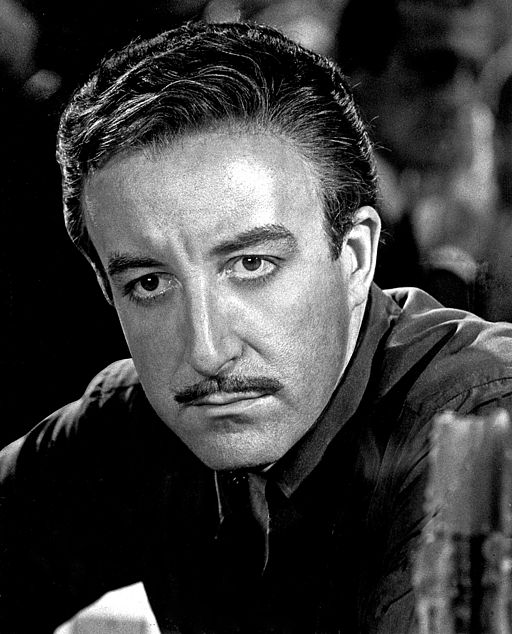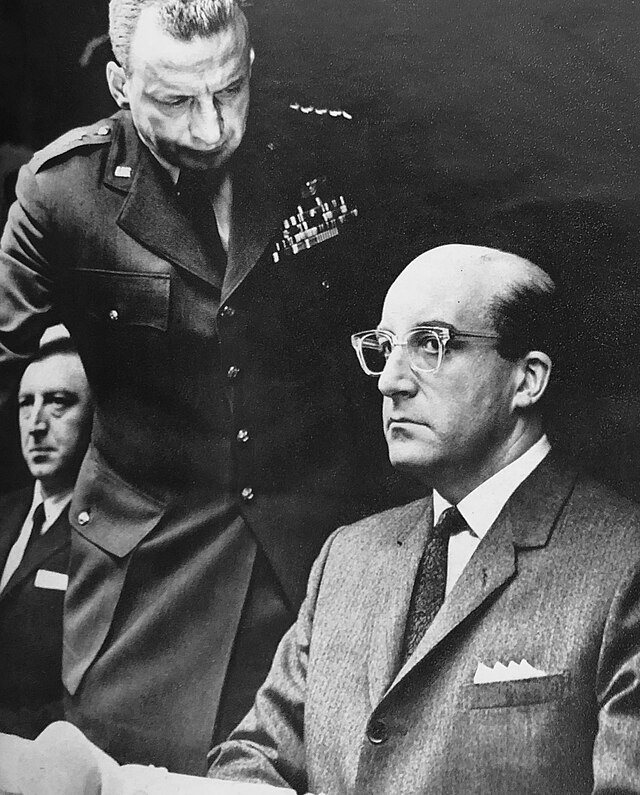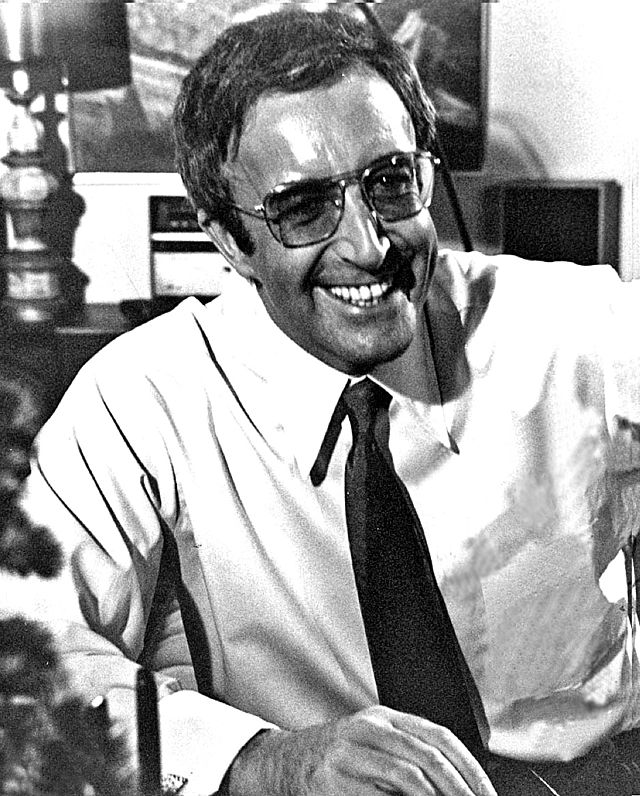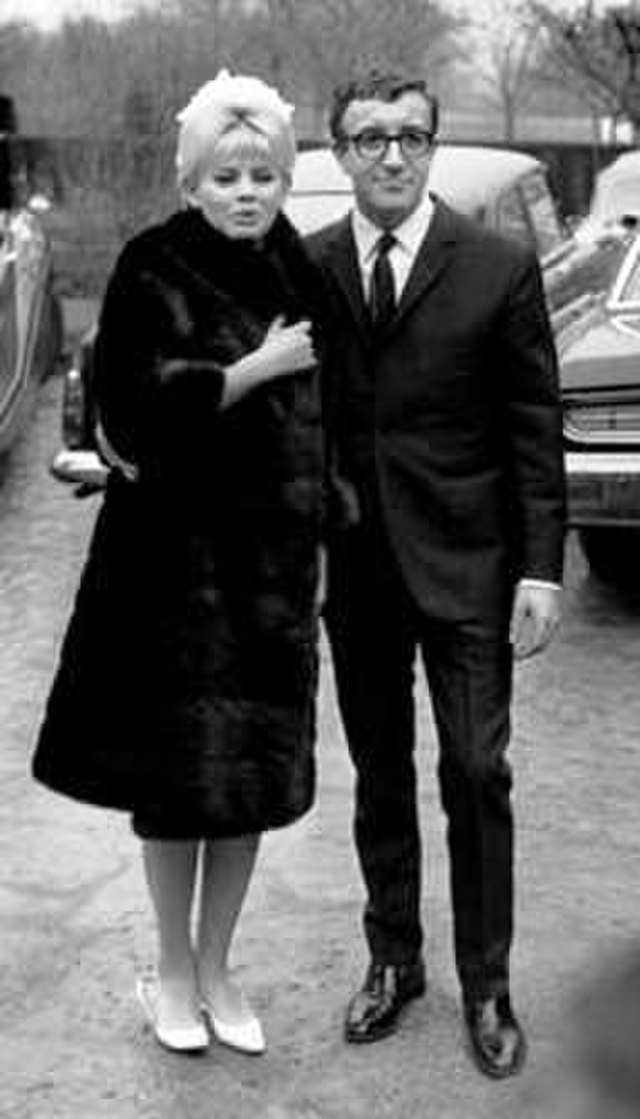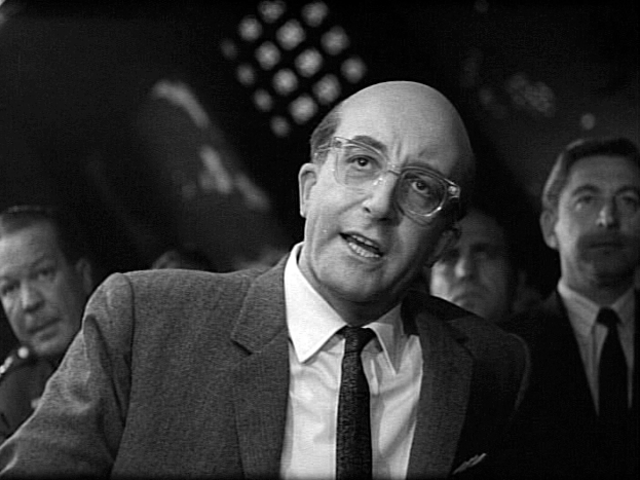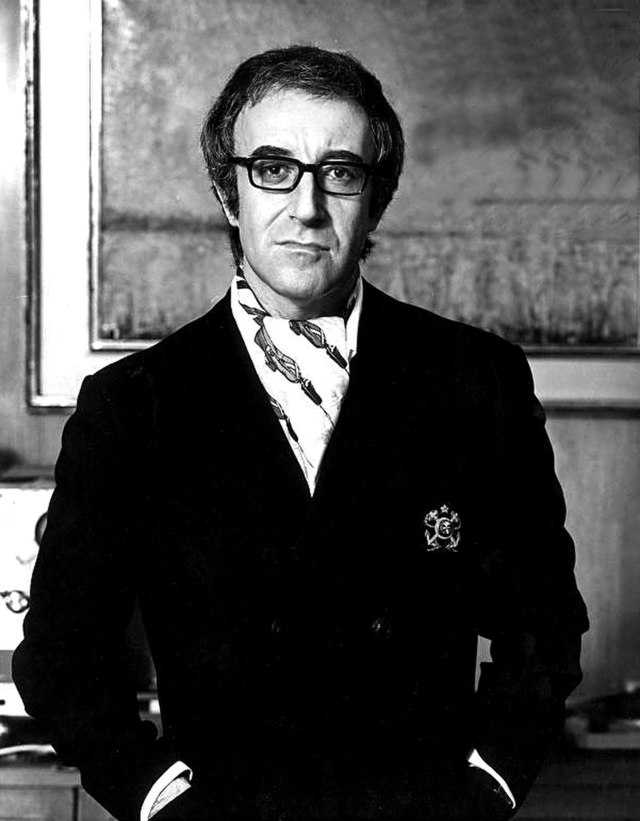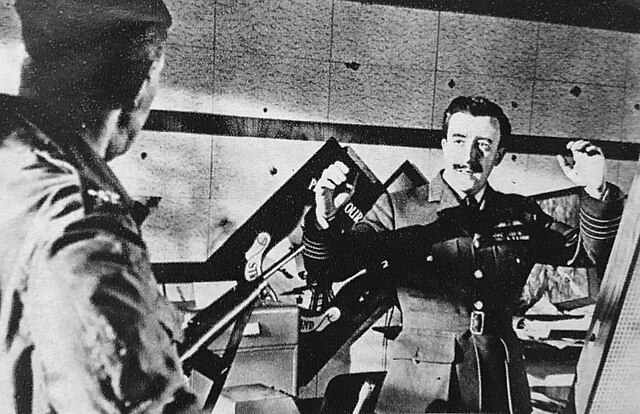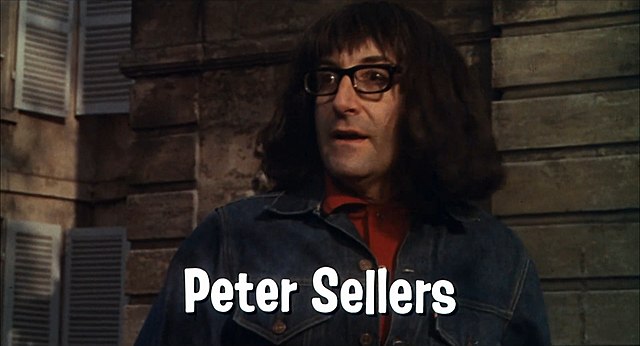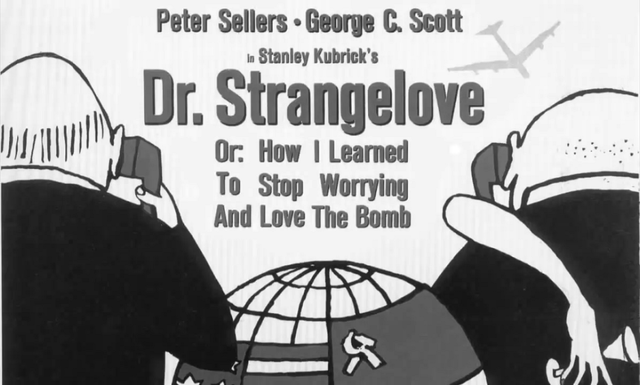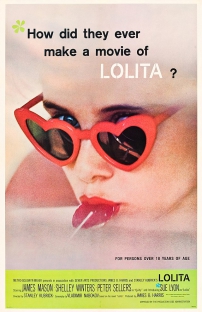Peter Sellers
back| Full Name | Richard Henry Sellers |
| Stage Name | Peter Sellers |
| Born | September 8, 1925 |
| Birthplace | Southsea, Portsmouth, England |
| Died | July 24, 1980 |
| Buried | Golders Green Crematorium, London, England |
| Married to | Anne Howe (m. 1951; div. 1961) - Britt Ekland (m. 1964; div. 1968) - Miranda Quarry (m. 1970; div. 1974) - Lynne Frederick (m. 1977; his death 1980) |
| Children | Michael Sellers (with Anne Howe) - Sarah Sellers (with Anne Howe) - Victoria Sellers (with Britt Ekland) |
| Notable films | The Ladykliiers (1955) - The Mouse That Roared (1959) - Lolita (1962) - The Pink Panther series (1963 - 1978) - Dr. Srangelove (1964) - Being There (1979) |
Peter Sellers
The Man of a Thousand Faces
Peter Sellers' film career took off in the 1950s with roles in British comedies such as "The Ladykillers" (1955) and "I'm All Right Jack" (1959), for which he won a BAFTA Award. He achieved international stardom with his role as Inspector Clouseau in "The Pink Panther" (1963), a character he would revisit in several sequels. Sellers' talent for physical comedy and his impeccable timing made Clouseau an iconic character in cinema history.
Sellers was also known for his ability to portray multiple roles in a single film, most notably in Stanley Kubrick's "Dr. Strangelove or: How I Learned to Stop Worrying and Love the Bomb" (1964), where he played three distinct characters. His performance in "Dr. Strangelove" earned him an Academy Award nomination.
Related
Peter Sellers (1925 – 1980)
Biography and Movie Career
Peter Sellers was born Richard Henry Sellers on September 8, 1925, in Southsea, Portsmouth, England, to Agnes Doreen "Peg" (née Marks) and William "Bill" Sellers. His parents were vaudeville entertainers, and young Peter was exposed to the world of performance from an early age. The family’s constant touring lifestyle meant that Sellers did not have a stable home life, which profoundly influenced his personality and later work. He was particularly close to his mother, who encouraged his interest in entertainment.
Path Towards Success: During World War II, Sellers joined the Royal Air Force, where he was part of the entertainment division, performing for the troops. This experience solidified his passion for acting and comedy. After the war, he found work on BBC Radio, where he became a key member of the groundbreaking comedy program "The Goon Show" (1951-1960). Sellers' ability to create and voice a wide array of characters made him a standout performer and brought him considerable acclaim.
Rise to Fame in Film: Peter Sellers transitioned to film in the 1950s, making a name for himself in British comedies. His first notable film was "The Ladykillers" (1955), where he played a supporting role in this dark comedy classic. By the end of the decade, he had established himself as a versatile comedic actor with films like "I'm All Right Jack" (1959), which earned him a BAFTA Award for Best Actor.
Sellers' international breakthrough came with "The Mouse That Roared" (1959), a satirical comedy in which he played multiple roles, showcasing his versatility. This was followed by his iconic portrayal of Inspector Jacques Clouseau in "The Pink Panther" (1963). His performance was so well-received that it spawned a series of sequels, cementing Clouseau as one of the most beloved characters in film history.
Notable Works: Among Sellers' most significant works is "Dr. Strangelove or: How I Learned to Stop Worrying and Love the Bomb" (1964), directed by Stanley Kubrick. Sellers played three different characters, demonstrating his exceptional range and earning him an Academy Award nomination. Other notable films include "A Shot in the Dark" (1964), "Being There" (1979), where he played the simple-minded gardener Chance, a role that brought him critical acclaim and another Academy Award nomination.
Personal Life: Peter Sellers' personal life was as complex and dramatic as his professional career. He was married four times:
- Anne Howe (1951-1961) - They had two children, Michael and Sarah. The marriage ended in divorce as Sellers' career took off and his behavior became more erratic.
- Britt Ekland (1964-1968) - The Swedish actress was 21 years younger than Sellers. They had a daughter, Victoria. The marriage was turbulent, marked by Sellers' jealous and controlling nature.
- Miranda Quarry (1970-1974) - This marriage also ended in divorce, attributed to Sellers' unpredictable behavior and health issues.
- Lynne Frederick (1977-1980) - Sellers' last marriage, which lasted until his death. This relationship was controversial due to their age difference and Sellers' declining health.
Passions and Interests: Beyond acting, Sellers had a keen interest in photography, often using it as a creative outlet. He was also passionate about cars, especially luxury and sports cars, and enjoyed collecting them. His personal and professional life was significantly influenced by his insecurities and his constant search for approval, traits that both fueled his creativity and led to his personal struggles.
Health Issues and Death: Peter Sellers' health was a recurring issue throughout his life. He suffered from heart problems, exacerbated by his heavy smoking and stressful lifestyle. In 1964, he had a series of heart attacks that nearly killed him. Despite this, he continued to work at a relentless pace.
On July 22, 1980, Sellers suffered a massive heart attack in London. He was taken to Middlesex Hospital, where he died on July 24, 1980, at the age of 54. His death marked the end of an era in comedy, but his legacy lived on through his films and the influence he had on generations of comedians and actors.
Peter Sellers left an indelible mark on the world of comedy and cinema. His ability to transform into a myriad of characters, combined with his impeccable comedic timing, made him a unique and unforgettable talent. Films like "The Pink Panther" series and "Being There" continue to be celebrated and enjoyed by audiences worldwide. Despite his personal demons, Sellers' work remains a testament to his genius and his contribution to the art of film and comedy.
The Best of Peter Sellers in The Pink Panther:
Peter Sellers Secrets:
Peter Sellers was a complex and enigmatic figure, and there are several aspects of his life that could be considered secrets or lesser-known details that contributed to his mystique. Here are some insights into the more secretive or hidden aspects of his life:
Personal Struggles and Insecurities:
- Identity Issues: Sellers often expressed a sense of having no real identity of his own. He once said, "If you ask me to play myself, I will not know what to do. I do not know who or what I am." This existential struggle made him a master of character transformation but also contributed to his personal turmoil.
- Mental Health: Sellers had significant mental health struggles, including bouts of depression and anxiety. His erratic behavior, mood swings, and volatile relationships were likely influenced by these issues. He often felt isolated despite his fame and success.
Health Problems:
- Heart Issues: Sellers had a long history of heart problems, which he kept relatively private. He suffered a series of heart attacks starting in 1964, which significantly impacted his health and lifestyle. His heavy smoking and stressful career exacerbated these issues.
Relationships and Marriages:
- Turbulent Marriages: Sellers' relationships were often tumultuous and marked by jealousy and control issues. His marriage to Britt Ekland, in particular, was marred by his paranoia and erratic behavior. Despite these challenges, he had moments of deep affection and vulnerability with his partners.
- Affairs and Infidelities: Sellers had numerous extramarital affairs, which contributed to the breakdown of his marriages. His need for constant validation and approval often led him to seek attention outside of his committed relationships.
Professional Challenges:
- Difficult to Work With: Sellers was known for being difficult on set. He could be demanding and unpredictable, sometimes clashing with directors and co-stars. Despite his brilliance, this behavior often strained professional relationships.
- Creative Control: Sellers had a strong desire for creative control over his projects. He often influenced the direction and production of his films, sometimes to the frustration of directors and producers. This need for control was partly driven by his insecurities and desire for perfection.
Financial Secrets:
- Lavish Spending: Sellers was known for his extravagant lifestyle, spending lavishly on homes, cars, and other luxuries. Despite earning substantial amounts from his films, his spending habits often left him in financial difficulty.
- Tax Evasion Allegations: There were allegations of tax evasion and financial mismanagement throughout his career. Sellers was known to have complex financial arrangements, and his finances were often a source of stress and controversy.
Deep Passions and Hobbies:
- Photography: Sellers had a deep passion for photography, a hobby that he pursued seriously. He often used photography as a creative outlet and a way to escape the pressures of his acting career.
- Spirituality and Occult Interests: Later in life, Sellers developed an interest in spirituality and the occult. He explored various spiritual practices and beliefs, seeking answers to his existential questions and inner turmoil.
Hidden Acts of Kindness:
- Generosity: Despite his difficult personality, Sellers had moments of great generosity. He often helped friends and colleagues in need, sometimes anonymously. These acts of kindness were a lesser-known aspect of his complex character.
Analysis of Peter Sellers' Acting Style
Peter Sellers was a multifaceted actor whose style was marked by his extraordinary versatility, attention to detail, and ability to completely immerse himself in a wide range of characters. Here’s a detailed analysis of his unique acting style:
Versatility and Range: Peter Sellers' acting style was defined by his unparalleled versatility. He had the rare ability to convincingly portray a vast array of characters, often within the same film. This was notably showcased in "Dr. Strangelove or: How I Learned to Stop Worrying and Love the Bomb" (1964), where he played three distinct roles: the bumbling Group Captain Lionel Mandrake, the ineffectual U.S. President Merkin Muffley, and the eccentric Dr. Strangelove. Each character was crafted with unique mannerisms, voices, and physicalities, demonstrating his wide-ranging talent.
Chameleon-like Transformations: Sellers was often referred to as a chameleon for his ability to disappear into roles. He had an exceptional skill for accents, dialects, and vocal modulations, which allowed him to convincingly portray characters from various backgrounds and nationalities. This talent was evident in characters like the bumbling French Inspector Clouseau in "The Pink Panther" series and the simple-minded gardener Chance in "Being There" (1979).
Physical Comedy: A significant aspect of Sellers' style was his mastery of physical comedy. He had a keen sense of timing and a gift for slapstick humor, which he brought to life through exaggerated movements, pratfalls, and expressive facial expressions. His portrayal of Inspector Clouseau is a prime example, where his physical antics—whether it’s tripping over a rug or misusing a piece of equipment—are executed with precision and comedic impact.
Attention to Detail: Sellers was known for his meticulous attention to detail in crafting his characters. He would often delve deep into the psyche of his roles, considering their backstory, motivations, and even the smallest quirks. This thorough preparation allowed him to bring authenticity and depth to even the most outlandish characters, making them memorable and relatable.
Psychological Depth: Despite being primarily known for his comedic roles, Sellers was capable of delivering performances with significant psychological depth. In "Being There," his portrayal of Chance the gardener is marked by subtlety and nuance. He conveyed the character's innocence and simplicity through minimalistic acting, allowing the audience to perceive the world through Chance’s eyes.
Improvisation and Creativity: Sellers was highly skilled in improvisation, often adding spontaneous and creative elements to his performances. His ability to think on his feet and adapt to the moment added an unpredictable and dynamic quality to his work. This improvisational talent was not only a testament to his quick wit but also contributed to the enduring humor of his characters.
Influence of Personal Struggles: Sellers' personal life, marked by insecurities and a quest for approval, often influenced his acting style. He channeled his own vulnerabilities and complexities into his performances, which added an underlying layer of authenticity and relatability to his characters. This connection between his personal struggles and his roles brought a unique intensity and realism to his work.
Transformation into Characters: Sellers had a method-actor-like approach to his work. He would often stay in character even off the set, immersing himself fully in the role. This deep dive into his characters helped him to deliver consistently convincing and powerful performances, as he truly became the person he was portraying.
Legacy and Impact: Peter Sellers' acting style has had a lasting impact on comedy and cinema. His ability to blend physical comedy with deep character work set a new standard for comedic performances. His influence can be seen in the work of contemporary actors who admire and emulate his ability to balance humor with complexity.
In summary, Peter Sellers' acting style was characterized by his versatility, attention to detail, mastery of physical comedy, and deep psychological insight. His ability to transform into a wide range of characters with authenticity and humor has left an indelible mark on the world of acting, making him one of the most revered and influential actors of his time.
Personal Quotes:
On Acting and Characters:
- "There used to be a me behind the mask, but I had it surgically removed."
- "If you ask me to play myself, I will not know what to do. I do not know who or what I am."
On Comedy:
- "Doubt is to certainty as neurosis is to psychosis. The neurotic is in doubt and has fears about persons and things; the psychotic has convictions and makes claims about them. In short, the neurotic has problems, the psychotic has solutions."
On His Craft:
- "I like to be as far away from myself as possible. If I can, I will try to find a character and see what the character needs to say. I will then see that they are given that chance to say it."
- "It's not that I want to hide it. I just don't want to talk about it."
On Life and Success:
- "I am a very ambitious person. I have a lot of dreams and they can come true if I just stick to it and work hard."
- "To see me as a person on screen would be one of the dullest experiences you could ever wish to experience."
On Fame:
- "Fame is like a palace, a city, a dream. It seems real enough while you are inside it, but at any time, reality may come through a trapdoor."
On Relationships:
- "I feel ghostly unreal until I become somebody else again on the screen."
What Others said about Peter Sellers:
Colleagues and Peers
- Blake Edwards (Director of The Pink Panther series):
"Peter was a genius with no character. He was a great performer but he didn't have any identity. I always said that if you peeled off one layer after another, you wouldn't find anything. There was no Peter Sellers."
- Stanley Kubrick (Director of Dr. Strangelove):
"He is the greatest actor I have ever worked with, and I think he will prove to be the greatest comic genius since Chaplin."
- Orson Welles:
"Peter Sellers is the only man I know who can be funny without saying a word."
- John Cleese (Comedian and Actor):
"Peter Sellers was a genius. There's no other way to describe him. He had an extraordinary talent."
Critics
- Roger Ebert (Film Critic):
"Peter Sellers was one of the most versatile and talented actors of his time, with an ability to completely transform himself into the characters he portrayed. His performances in films like 'Dr. Strangelove' and 'Being There' are timeless examples of his genius."
- Pauline Kael (Film Critic):
"Sellers had an almost uncanny ability to disappear into his roles, to become the characters he played so completely that it was sometimes difficult to remember that there was an actor behind the performance."
Friends and Family
- Spike Milligan (Co-star in The Goon Show):
"Peter was a man of many talents, but he was also a deeply troubled soul. He could be wonderfully kind and generous one moment, and terribly difficult the next."
- Britt Ekland (Ex-wife):
"Peter was a complex and contradictory man. He could be incredibly loving and charming, but also incredibly difficult and unpredictable. Living with him was like living on a rollercoaster."
Awards and Recognition:
Major Awards and Nominations
Academy Awards:
- Nominee: Best Actor in a Leading Role for "Dr. Strangelove or: How I Learned to Stop Worrying and Love the Bomb" (1964)
- Nominee: Best Actor in a Leading Role for "Being There" (1979)
BAFTA Awards:
- Winner: Best British Actor for "I'm All Right Jack" (1959)
- Nominee: Best British Actor for "The Naked Truth" (1957)
- Nominee: Best British Actor for "The Battle of the Sexes" (1959)
- Nominee: Best British Actor for "The Millionairess" (1960)
- Nominee: Best British Actor for "Only Two Can Play" (1962)
- Nominee: Best British Actor for "The Pink Panther" (1963)
- Nominee: Best British Actor for "Dr. Strangelove or: How I Learned to Stop Worrying and Love the Bomb" (1964)
- Nominee: Best British Actor for "Being There" (1979)
Golden Globe Awards:
- Winner: Best Actor in a Motion Picture – Musical or Comedy for "I’m All Right Jack" (1960)
- Nominee: Best Actor in a Motion Picture – Musical or Comedy for "Dr. Strangelove or: How I Learned to Stop Worrying and Love the Bomb" (1964)
- Nominee: Best Actor in a Motion Picture – Musical or Comedy for "The Pink Panther" (1963)
- Nominee: Best Actor in a Motion Picture – Musical or Comedy for "The Return of the Pink Panther" (1975)
- Winner: Best Actor in a Motion Picture – Musical or Comedy for "Being There" (1979)
British Comedy Awards:
- Lifetime Achievement Award (1990, posthumously)
Laurel Awards:
- Winner: Golden Laurel for Top Male Comedy Performance for "The Pink Panther" (1964)
- Winner: Golden Laurel for Top Male Comedy Performance for "A Shot in the Dark" (1965)
- Winner: Golden Laurel for Top Male Comedy Performance for "Dr. Strangelove or: How I Learned to Stop Worrying and Love the Bomb" (1965)
Other Recognitions
Venice Film Festival:
- Winner: Best Actor for "I’m All Right Jack" (1959)
Evening Standard British Film Awards:
- Best Actor for "Being There" (1980)
Grammy Awards:
- Winner: Best Comedy Performance for "The Best of Sellers" (1959)
- Nominee: Best Comedy Performance for "Songs for Swingin' Sellers" (1960)
- Winner: Best Comedy Recording for "How to Win an Election" (1961)
National Board of Review:
- Best Actor for "Being There" (1979)
Honorary Recognitions
Commander of the Order of the British Empire (CBE):
- Awarded in 1966 for his contributions to the arts.
Movies Starring Peter Sellers:
1951: "Penny Points to Paradise" - A comedy about two lottery winners who head to Brighton to celebrate but find themselves mixed up in a criminal plot.
1952: "Down Among the Z Men" - A slapstick comedy where members of the Goon Show are involved in a military camp's chaotic events.
1955: "The Ladykillers" - A dark comedy about an old lady who unwittingly rents her room to a gang of criminals planning a heist.
1957: "The Smallest Show on Earth" - A young couple inherits a dilapidated cinema and tries to turn it into a success.
1959: "Tom Thumb" - A fantasy film based on the fairy tale of a tiny boy who embarks on various adventures.
"The Mouse That Roared" - A satirical comedy about a tiny country that declares war on the United States to lose and receive aid but accidentally wins.
1960: "Never Let Go" - A crime drama about a man seeking to retrieve his stolen car from a gang of criminals.
"Two-Way Stretch" - A comedy about prisoners planning a heist while still incarcerated.
1961: "The Millionairess" - A romantic comedy where a wealthy woman must marry someone who can turn 500 pounds into a fortune in three months.
"Mr. Topaze" - A satire where a naive teacher turns into a corrupt businessman.
1962: "Only Two Can Play" - A comedy where a librarian becomes involved in a series of comedic misadventures due to his flirtatious behavior.
"Waltz of the Toreadors" - A retired general contends with his infidelities and his long-suffering wife.
1963: "The Wrong Arm of the Law" - A comedy about a criminal who teams up with the police to catch a rival gang.
"Heavens Above!" - A satire about a well-meaning vicar whose attempts to help the poor disrupt his community.
"The Pink Panther" - A comedy-mystery featuring the bumbling Inspector Clouseau attempting to catch a jewel thief.
1964: "Dr. Strangelove or: How I Learned to Stop Worrying and Love the Bomb" - A black comedy about the absurdity of nuclear war, where Sellers plays multiple roles.
"The World of Henry Orient" - A comedy about two schoolgirls who become infatuated with a pianist.
"A Shot in the Dark" - Inspector Clouseau investigates a murder at a millionaire's estate, leading to a series of comedic blunders.
1965: "What's New Pussycat?" - A comedy about a womanizing magazine editor who seeks help from an unorthodox psychiatrist.
"The Wrong Box" - A black comedy about a tontine and the various unscrupulous efforts to claim the money.
1966: "After the Fox" - A comedy about a master criminal who disguises himself as a film director to smuggle gold.
1967: "Casino Royale" - A James Bond spoof where Sellers plays one of the multiple agents named James Bond.
"The Bobo" - A comedy about a Spanish singer who attempts to woo a beautiful woman to advance his career.
1968: "The Party" - A comedy about a bumbling Indian actor who accidentally gets invited to a lavish Hollywood party.
1969: "The Magic Christian" - A satirical comedy about a wealthy man and his adopted son who use money to test people's greed and corruption.
1970: "There's a Girl in My Soup" - A comedy about a vain TV chef who has a romantic fling with a young woman.
1972: "Where Does It Hurt?" - A satire about the American healthcare system, focusing on a greedy hospital administrator.
"Alice's Adventures in Wonderland" - A musical adaptation of Lewis Carroll's classic tale, where Sellers plays the King of Hearts.
1973: "The Blockhouse" - A war drama about a group of soldiers trapped in a bunker during WWII.
1974: "Soft Beds, Hard Battles" - A comedy set in WWII about a French brothel aiding the Resistance.
1975: "The Return of the Pink Panther" - Inspector Clouseau is back on the trail of the stolen Pink Panther diamond.
"The Great McGonagall" - A biographical comedy about the infamous poet William McGonagall.
1976: "The Pink Panther Strikes Again" - Clouseau is pursued by a vengeful former Chief Inspector Dreyfus, leading to global chaos.
1978: "Revenge of the Pink Panther" - Clouseau fakes his death to catch a drug lord.
1979: "Being There" - A satirical film where Sellers plays Chance, a simple gardener mistaken for a wise political advisor.
1980: "The Fiendish Plot of Dr. Fu Manchu" - A comedy where Sellers plays both the evil mastermind Fu Manchu and his nemesis, Nayland Smith.

